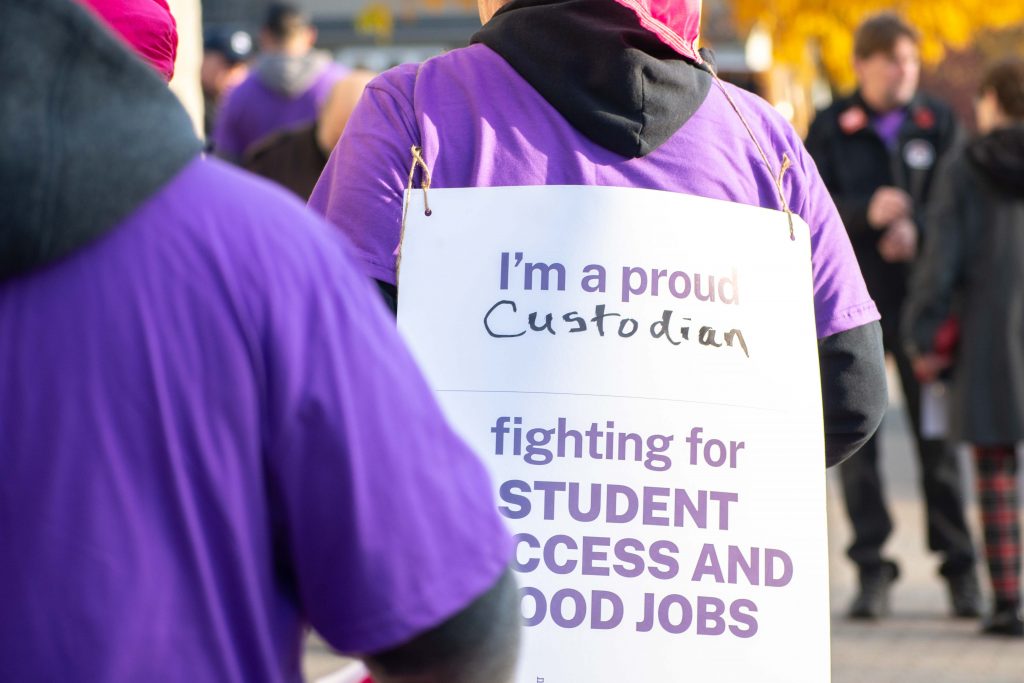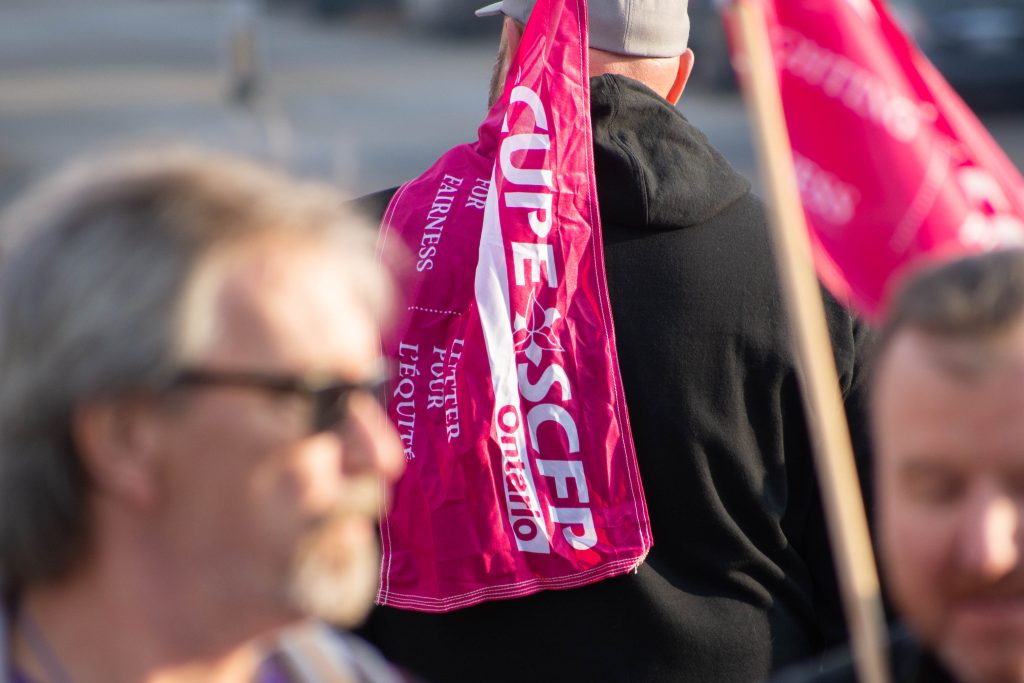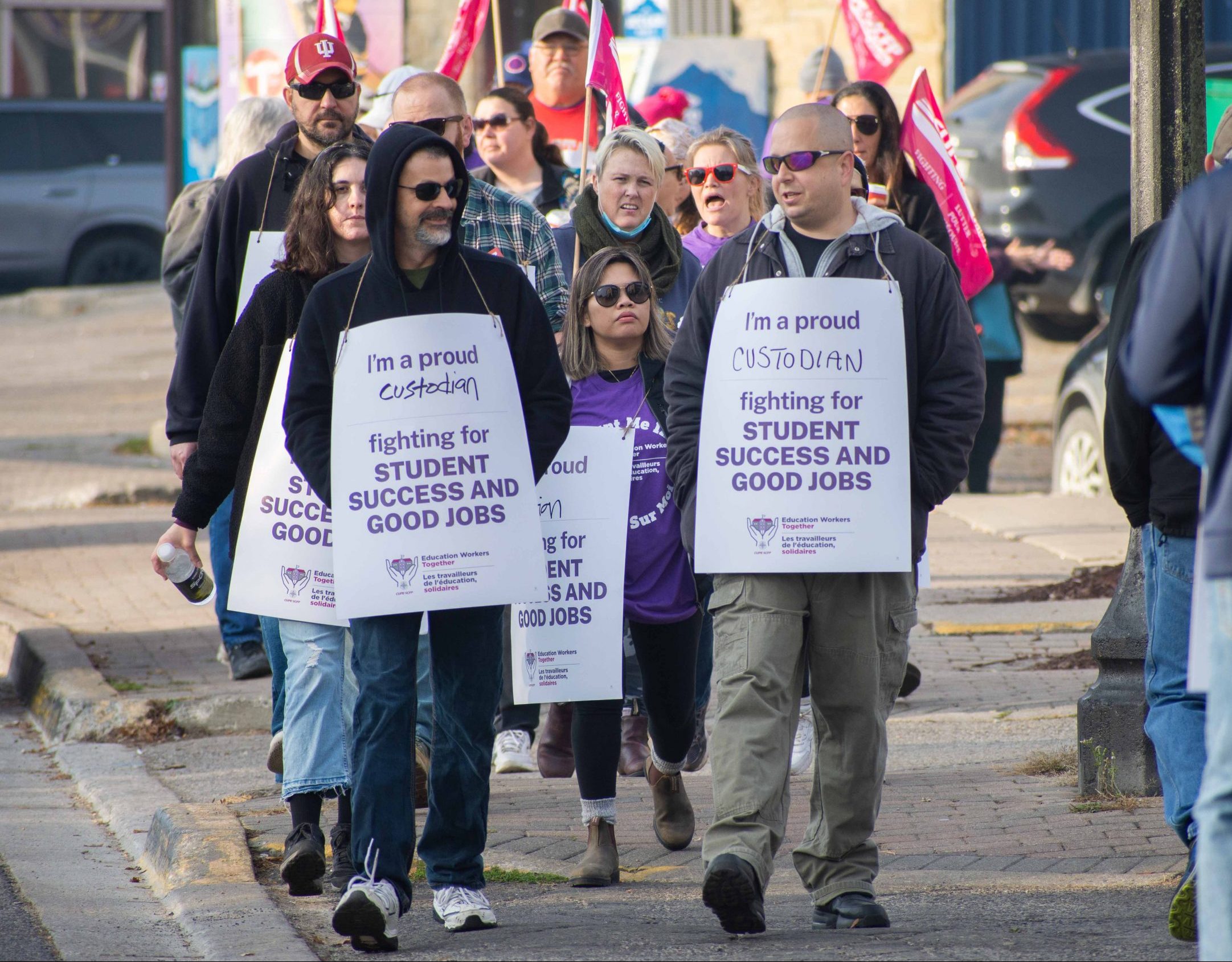FERGUS – “Who has the power?” a woman yells. “We’ve got the power,” they respond.
Education workers from Wellington County’s two school boards, who are represented by the Canadian Union of Public Employees (CUPE), were on strike Nov. 4 and actively protesting around the constituency office of Wellington-Halton Hills MPP Ted Arnott in downtown Fergus.
The strike comes following a breakdown in contract negotiations between the province and the union yesterday and the passing of the Keeping Kids in Class Act (Bill 28), which forces a four-year contract on workers, and uses the Canadian Charter of Rights and Freedoms’ notwithstanding clause to suspend the right to strike for five years. According to Education Minister Stephen Lecce, the Nov. 4 strike is illegal.
At the heart of the bargaining dispute is the union’s ask for a nearly 50 per cent wage increase, or 11.7 per cent per year, over four years. The union argues wage increases over the past decade haven’t kept pace with inflation, and its education workers, which it says are the lowest paid in the sector, are struggling to make ends meet.
The province’s most recent offer was for a 2.5 per cent yearly wage increase, or 10 per cent over four years, for employees earning less than $43,000, and 1.5% for those earning more.
Despite government threats of heavy fines—$500,000 per day for the union and $4,000 for individual members—members of CUPE Local 256 began protesting the government’s action at 8am, here, and at the offices of parliament members in Guelph and Orangeville.
In an email to the Advertiser, Arnott said he is at the office and attending to scheduled appointments, but had not received a request to meet with striking workers protesting outside.
“As always, my staff and I are available to respond to inquiries pertaining to the provincial government, and we seek to ensure that everyone’s voice is heard,” he wrote.
Between 60 and 70 members are pacing the sidewalks surrounding Arnott’s office by 9am. Many wear placards over purple shirts, displaying their roles within the school boards.
Custodial and maintenance workers walk alongside English-as-a-second-language instructors, occasional teachers, and the public chanting—”Lecce and Ford have got to go”—as piercing whistles, and a donging cowbell mix with honking horns from passing cars.
Two locals residents unrelated to the union, Ciara Cruickshank and Lisa Town, came to show workers they’re supported outside their union.
“We believe in the cause, we support the workers, we support their rights, we support their right to their collective bargaining,” Cruickshank says.
Andrew Aloe, president for an Occasional Teacher Local of the Elementary Teachers’ Federation of Ontario, also came out with four members to show solidarity.
“The energy is good, you’re trying to make the best of it,” CUPE Local 256 president and strike captain Bill Foster says, taking a pause from rousing the members.
Members have been instructed to have fun and get people motivated. Over and over, they loop up and down St. Andrews Street and Gowrie Street holding CUPE flags and signs.

Canadian Union of Public Employees Local 256 president Bill Foster rouses members during a strike in Fergus on Nov. 4. Photo by Jordan Snobelen
It may be fun for the first day, but if the strike continues Foster says reality will begin to settle in and the days will become harder, both for members and the affected school boards.
“The bad thing is, the schools, they’re going to be shutting down,” says Foster. “It’s a shame we’re here.”
All schools across the county remained open on Friday, but Upper Grand and Wellington Catholic District School Board education directors have hinted at closures being likely if the strike continues into next week. (Not all schools would be affected because some don’t have CUPE-represented staff.)
On Friday morning, Upper Grand District School Board (UGDSB) education director Peter Sovran told the Advertiser, “we don’t think that we’re going to be able to sustain this level of being open for very long; we’re talking about days, certainly not weeks.”
Sovran said the board is “signalling to everyone, including families” to prepare for a switch to remote learning.
“We hear from our students and our families that they want to be in their buildings, in their classrooms, with their friends, and that’s what we’re going to try and do to the best of our ability,” he said.
“There will be a point though where we won’t be able to provide that, certainly not on the backs of the individual who are stepping in and supporting schools right now with these additional cleaning functions.”
There’s a contingency committee evaluating schools with a colour-coded system, and non-unionized staff are stepping up— “over and above their regular responsibilities,” Sovran said—to provide basic support and stand in for custodial and trades workers who typically fix and maintain critical infrastructure.
“They’re employed by the [UGDSB] because we need them,” Sovran said of the board’s education workers, adding, “when they’re not in we all feel it.”
If there’s a major issue, such as a busted water pipe, for example, Sovran says there are few trained staff available to handle such an emergency. That’s led to a reduction of secondary school uses, such as community use.
“We will reassess by Sunday night, if this is continuing, then there will be more cancellations,” Sovran said, adding, “the more you use a school building, the more likely you’re going to run into some of these maintenance issues.”

A CUPE member displays a placard during a strike in Fergus on Nov. 4. Photo by Jordan Snobelen
In a prepared statement, Wellington Catholic District School Board (WCDSB) education director Michael Glazier said, “This has been very difficult for our staff, and will become very challenging for our families if it is necessary for us to close schools if labour action extends into next week.”
WCDSB spokesperson Ali Wilson previously said, in an Oct. 31 press release, that the board encourages families to prepare for remote learning.
In an emailed statement, WCDSB chair Vikki Dupuis wrote, “The breakdown in negotiations will have a direct impact on our students and their families as well as on our staff and their families.”
“We all want students to remain in school and to experience a normal year of learning,” she added, expressing a desire for the union and province to “reengage in discussions for the benefit of all involved.”
UGDSB chair Linda Busuttil did not respond to a request for comment.
CUPE members have hopes the provincial government and union will return to talks, or that the federal government will intervene, but Foster says members are prepared to ride out the stike.
He emphasizes the strike has nothing to do with local school boards, saying the issues are central.
Both education directors agree.
In his emailed statement, Glazier said “items discussed such as wages and work conditions are central table items” and hopes are for speedy resolution at the provincial level.
Sovran said, in part, that the UGDSB has “always had great relationships with our labour partners and we continue to have a great relationship.”

A CUPE member displays an union flag during a strike in Fergus on Nov. 4. Photo by Jordan Snobelen
Each day members are on strike and not at work, they aren’t paid by their employer, however, the union provides its members with “strike pay.”
Foster says Bill 28 has stripped members of their constitutional and bargaining rights and “not only put a four-year deal on us, [it has] locked us at local bargaining for four years.”
“Lecce and Ford put us in this position, we’re going to ride it out.”




